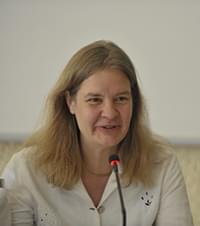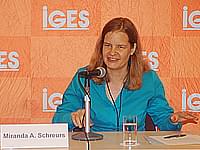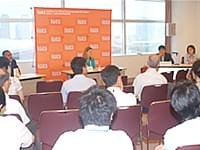- IGES Home
- ISAP Home
- ISAP 2012 Home
- Interactive Prof. Dr. Miranda Schreurs
ISAP Interactive Session with Prof. Dr. Miranda Schreurs
| Date / Time | 25 July 2012 16:00-17:00 |
|---|---|
| Venue | Pacifico Yokohama Room 511/512 |
| Guest speaker | Prof. Dr. Miranda Schreurs, Director of the Environmental Policy Research Institute, The Freie Universitat Berlin |
| Interviewers | Ayumi Goto, Associate Researcher, IGES Yoshiaki Totoki, Researcher, IGES |
| Facilitator | Janardhanan NANDAKUMAR, Energy Policy Researcher, IGES |
Brief profile
Prof. Dr. Miranda Schreurs, |
Key Discussion Points
---Why have you decided to have your research focus on comparative study on international environmental policy? Also, why did you have your research in Japan?
Reasons for focusing on comparative and international dimension of environmental policy is that when I was in Japan in the 1980s as an exchange high school student, I discovered that there was a lot of potential to look at environmental policies in Japan. There was a lot of research done on Minamata and Itaitai disease, but internationally there was discussion about acid rain, ozone depletion and climate change. When I was thinking about dissertation topic, I discovered that nobody had written yet about Japanese responses to global environmental politics. That’s why I started to look at this question.---- Regarding Post-Fukushima nuclear policy, Germany decided not to continue nuclear dependency. However, the Japanese government decided for restart nuclear power plants that were closed down in the immediate aftermath of the accident. How do you view these differences in decisions of Germany and Japan? When you compare these situations, how do you take into consideration cultural difference and social background that shape the policy decisions?
Before answering the question, another reason for conducting comparative study was that there was a fellowship opportunity to conduct comparative study between Germany and Japan, given from MacArthur foundation. I’m not German but I have looked into German and Japanese policy for long time. With regard to the comparison of Germany, United States of America and Japan in relationship to climate and energy issues, I started to see the important differences in cultural and institutional arrangements of the countries. I became interested in thinking about why Germany was able to establish large green party and large environmental NGOs and how did that impact changes in German responses to environmental problems. In the US, there are also many large environmental organisations. In the case of global environmental issues, however, the USA is no longer the environmental leader. So why is the influence of large NGOs not strong enough to still push through environmental policy change? For me Japan was a state in the middle in between Germany and the US with much weaker NGO community compared to either countries. At the same time, the Japanese case is taking a technological approach to deal with environmental issues such as pushing energy efficiency and top runner programmes. That’s how I started to look at Japan and Germany which is also the reason why I was asked to join the ethics committee because of my experience in studying comparative politics.
With regard to the comparison of Germany, United States of America and Japan in relationship to climate and energy issues, I started to see the important differences in cultural and institutional arrangements of the countries. I became interested in thinking about why Germany was able to establish large green party and large environmental NGOs and how did that impact changes in German responses to environmental problems. In the US, there are also many large environmental organisations. In the case of global environmental issues, however, the USA is no longer the environmental leader. So why is the influence of large NGOs not strong enough to still push through environmental policy change? For me Japan was a state in the middle in between Germany and the US with much weaker NGO community compared to either countries. At the same time, the Japanese case is taking a technological approach to deal with environmental issues such as pushing energy efficiency and top runner programmes. That’s how I started to look at Japan and Germany which is also the reason why I was asked to join the ethics committee because of my experience in studying comparative politics.One of the similarities between Germany and Japan is that both countries decided on nuclear energy as a key for energy sources in the 1960s. Both countries focused on the development of nuclear energy. The big difference was about how the public received this decision. In the German case, there was already opposition to nuclear power plants in the 1970s. There are several reasons for this. The first one is the concern about ‘nuclear power in my backyard’. The second reason is that during the Cold War, it was difficult for people to de-link nuclear energy for military from peaceful use of nuclear power. The third reason is that networks of NGOs were formed in Germany. So it was not only a local but also a national movement of protest, and this movement strengthened the Green Party’s stance against nuclear. In the Japanese case, there was local movement against nuclear power plants; however, it never managed to form a network at the national level like in Germany. So the opposition was more localised. This probably made it easier for the government and industries to find ways to compensate and convince communities to accept nuclear power plants.
These two differences are important to understand the reactions after the Chernobyl nuclear accident. For Germany, the accident was a big thing. People were concerned about the safety of nuclear power plants and questioned whether nuclear energy should remain in German or not. For the Japanese case, the Chernobyl accident was just far away and it did not bring the same impact as it did in Germany.
The Fukushima accident was very important as it highlighted the differences in the two societies. There already was strong opposition to nuclear energy for 25 - 30 years in Germany. The German government made a decision which was very unpopular. In 2010 the German government decided to change policy and allow the nuclear power plant to run for another 8-12 years on average. This decision was very unpopular with the German public. Then Fukushima happened. The Government was under tremendous pressure to reconsider its nuclear policy. Germany has always looked at Japan as another country with high technological ability which in turn raised questions about ‘can we really have safe nuclear power or not?’. It is interesting to me how the Fukushima nuclear accident will make changes in the society and in Japanese politics. There are small social movements, they are slowly coming together and are combining more and more to make a network and getting powerful. Something is already changing since there are demonstrations in front of the prime minister’s office. In fact, the public is sending strong message to the Japanese government to reconsider the nuclear policy. Clearly the socio-political background of the two countries is different and this influences the outcomes.
---- In relation to energy security, I was interested in the argument in your paper that in the US, the linkage of energy security with climate change opened up the possibility to argue for changing energy policies. The debate over energy alternatives has reinforced the different framing of climate change policies. In Japan, it seems that we are facing a similar framework. What lessons can we learn so as to change the framing of climate change in Japan?
It has not happened in the US yet but there was an effort to try to make it happen. In the era of Vice President Al Gore, he had a commission that was established to reconsider the definition of security to think about environment and energy security. This started an important debate in the US, and was also introduced to other countries too, stating that maybe the definition of security was too narrow. It only referred to military security without other dimensions of human and environmental security.I think the important aspect about the debate was that it made people think about ‘why is environmental protection important’, ‘why is energy and environmental linkage important’. In the German context, what we see is a lot of thinking about linkages between energy security, international relations as a security question, climate change and environment.
 Thinking about the alternative forms of energy, to the extent you can shift away from fossil fuel, you can improve climate change situation, and minimise a lot of security problems that could emerge from climate change such as climate refugees and conflicts from water shortages, etc. If you can reduce dependence on oil maybe you can start to invest in more countries and regimes that have political systems that you are more willing to support. Many of the oil-rich countries are also countries that are not the most democratic countries. If you can shift towards the definition of energy climate and environment that bring these together you may also be promoting democracy at home by thinking about new forms of producing energy that empower more local people. So I think this is one of the important debates.
Thinking about the alternative forms of energy, to the extent you can shift away from fossil fuel, you can improve climate change situation, and minimise a lot of security problems that could emerge from climate change such as climate refugees and conflicts from water shortages, etc. If you can reduce dependence on oil maybe you can start to invest in more countries and regimes that have political systems that you are more willing to support. Many of the oil-rich countries are also countries that are not the most democratic countries. If you can shift towards the definition of energy climate and environment that bring these together you may also be promoting democracy at home by thinking about new forms of producing energy that empower more local people. So I think this is one of the important debates.I am afraid that in the US there is still too much emphasis on traditional fossil fuels and so shifting away from the idea of traditional security or energy security to environmental-energy security link has not yet made the breakthrough in the US.
----I would like to hear your advice on conducting comparative studies for international environmental policies. How can the researchers deal with the differences in cultural and social background for a comparative study? Also, how can a researcher make policy recommendations with consideration on these points?
This issue is part of a big debate on how you can scale up a lot of best practice examples and how you can help to spread them. The best practice in one society would not be the best practice in other society. You cannot just come in and tell people that we do it this way and you should do it that way. You need to understand the local situations. Actually, not many researchers are trying to look at those linkages. You need to understand the differences of societies in culture, institutions and livelihood.But at the same time, there is amazing process of diffusion of ideas going on. Many cities have adopted CO2 reduction targets and set their own sustainability plans. The ideas are traveling across similar kind of systems. A number of countries have applied the Feed-in Tariff (FIT). Japan is the most recent country which began FIT for renewable energy, because the idea has proved worthwhile in many societies. At the same, many countries have changed FIT to better suit in their society. So FIT in Germany is different from Japanese one.
We need more exchange to learn more what the best practices and ideas are, and how they would be transferred from one place to another. Japan is now struggling with the Fukushima accident and Germany is struggling with the nuclear phase out. There is great potential to learn from each other. Germany can learn about energy efficiency since Japan has good examples. On the other hand, Japan can learn how to promote the development of renewable energy and sustainable communities.
--- We are interested in knowing the success factor in phasing out nuclear power in Germany. What do you think was the critical factor in making this phase- out happen?
In Germany the question goes beyond nuclear and deals with what society we are building, what we are doing to our living environment and the quality of life. So it is a critical assessment of a push towards development that is not sustainable. And nuclear is the most important of all those questions because emphasis on nuclear is making it difficult for other forms of energy. So much of Government investment and research and development went into nuclear and there was a feeling in Germany that it was suppressing the potentials for renewable. There was a feeling that with a nuclear accident you have the potential for a catastrophic accident with the dimension of accidents any other forms of energy cannot have. You can have many people die from coal mine accidents and gas explosions but what we see with Chernobyl or Fukushima is the contamination that can impact large regions and have health implications for a long time and it can go way beyond national boundaries and can affect future generations. There also is another question related to thoughts on future generations. Can we just focus on our own pleasure? Considering the rate at which we are using fossil fuels, the rate at which we are depleting resources, one has to question what the changes are that we are leaving for future generations. And there is also the issue of radioactive waste. It will have to be in somebody’s backyard. With all of these issues and the Fukushima experience, the decision was made to phase out nuclear power. I don’t think Germany’s Chancellor Angela Merkel made the decision. I think the German people made the decision. And Ms. Merkel reacted to that and said “I have to listen to the people at this point”. The people demanded to move towards an energy system that is environmentally safe and more ethical in relation to future generations.Observation of the interviewers/acknowledgements
With the increasing concerns on energy and environmental related issues, Japan and Germany are emerging as leading players in setting a new era of global energy sector with significant reduction planned in the share of nuclear power in the fuel mix. Prof. Miranda Schreurs, with her broad expertise in international comparative politics and in contributing to the energy policy in Germany, highlights that the global energy sector is now at a crossroads where public opinion needs to play a pivotal role in policy-making. As an expert on comparative politics and environmental policies she also points out that socio-economic and political feasibilities need to be taken into consideration as exchange of best practices on energy and environment are carried out between countries. According to Prof Schreurs, women need to play an increasingly active role in shaping the public policy making in any economy, especially related to energy and environment. At the ISAP interactive platform Prof. Schreurs discussed various important topics related to energy and environment and highlighted a number of research themes on comparative environment politics for potential consideration for future research.We take this opportunity to thank Prof. Schreurs for sharing her views on these critical topics and enriching to IGES’ on-going policy research on various nuances on global environmental policy.



 Go to top of page
Go to top of page